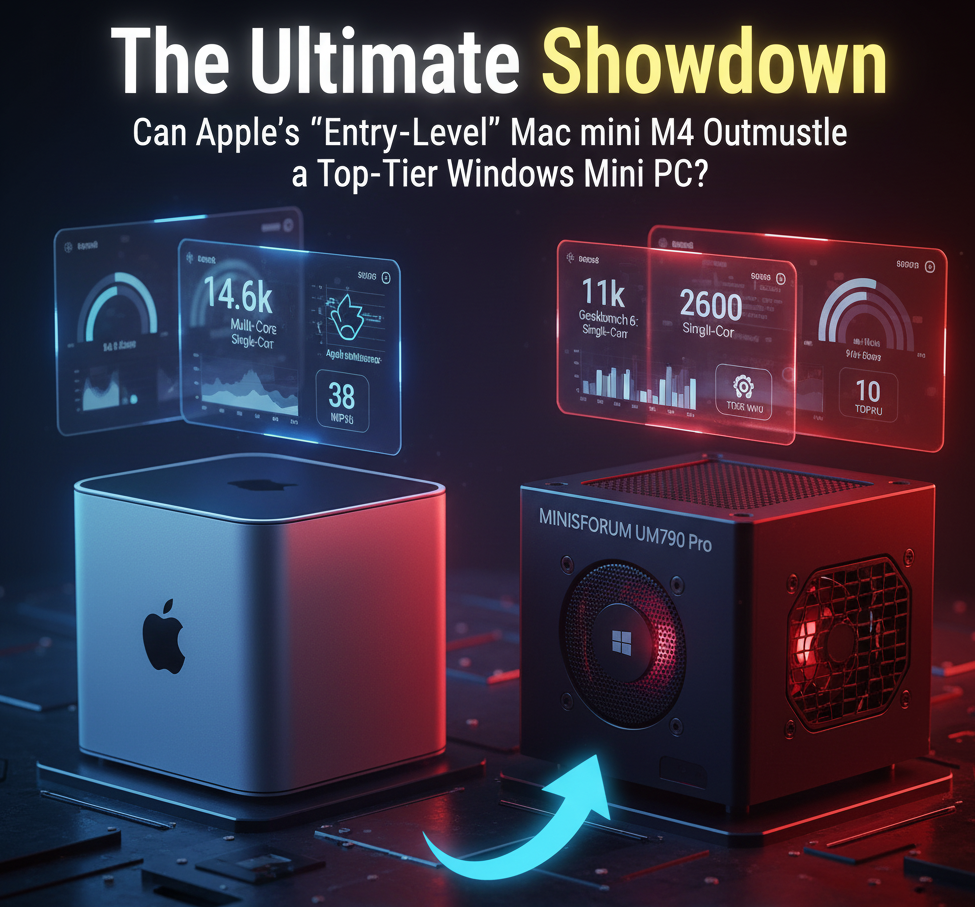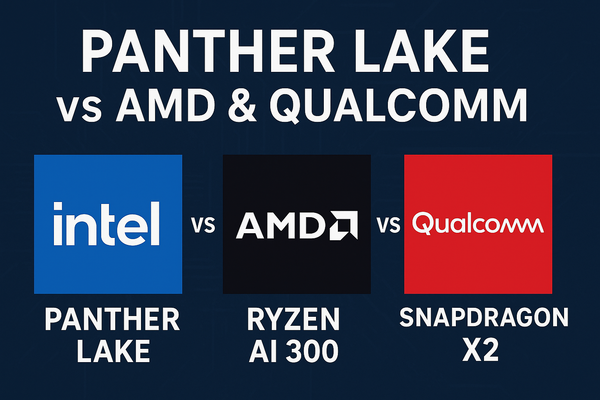Can Apple's "Entry-Level" Mac mini M4 Outmuscle a Top-Tier Windows Mini PC?

Today we're about to dive into a battle of the compact titans: in one corner, we have the undisputed champion of customizability and raw AMD power, represented by a typical Ryzen 9 7940HS Windows Mini PC (think something like the beastly MINISFORUM UM790 Pro). And in the other corner, looking deceptively calm, is the entry-level Mac mini, now rocking the brand-new M4 chip (with a solid 16GB RAM and 256GB SSD).
Can Apple's "base model" really take on a souped-up Windows machine? Let's break down the specs and see who's flexing harder!
Round 1: Raw CPU Horsepower – M4 Just Says "Hold My Coffee"
Okay, let's be real. The Ryzen 9 7940HS is no slouch. It's an 8-core, 16-thread Zen 4 monster that can hit 5.2 GHz. On paper, it sounds like a desktop king, pulling impressive multi-core scores around 11,000 in Geekbench 6. It's got adjustable power, meaning manufacturers can crank up the wattage for sustained tasks.
But then the M4 Mac mini steps in. With its 10-core CPU (a smart mix of 4 performance and 6 efficiency cores), it doesn't just match; it dramatically overtakes it. We're talking Geekbench 6 scores of around 3,780 single-core and a whopping 14,600 multi-core!
Why it matters: This isn't just numbers. It means your Mac mini will feel snappier, compile code faster, render videos quicker, and juggle a dozen demanding apps with a silent, cool confidence that the Windows mini PC, even at its best, might struggle to maintain without sounding like a tiny jet engine. The M4 isn't just faster; it's blazingly efficient.
Round 2: GPU Grunt – Gaming vs. Pro Powerhouse
The AMD side boasts the integrated Radeon 780M (RDNA 3). For an integrated GPU, it's pretty darn good! You can absolutely play light-to-medium 1080p games, and it's roughly equivalent to a laptop GTX 1650. If PC gaming is your jam, this might seem like a win.
But the 10-core M4 GPU is playing a different game. It comes with hardware-accelerated Ray Tracing and Mesh Shading, and its optimized Metal API integration makes it a beast for professional applications. While the Mac gaming ecosystem isn't as vast as Windows, for video editing, 3D rendering in supported apps, and graphic design, the M4 is the undisputed creative king. It's built for serious work.
Media Encoding: AV1 and ProRes – M4's Secret Weapon Speaking of serious work, the M4 Mac mini comes with dedicated hardware accelerators for H.264, HEVC, ProRes, and ProRes RAW. Plus, it boasts AV1 hardware decoding. If you're knee-deep in Final Cut Pro, DaVinci Resolve, or any ProRes workflow, the M4 isn't just fast; it's effortless. The 780M handles H.264/HEVC/AV1 encoding/decoding too, offering flexibility on Windows, but the M4's ProRes capabilities are a niche, high-performance win.
Round 3: The AI Brawl – NPU Powerhouse!
We're in the age of AI, and the Neural Processing Unit (NPU) is where the magic happens for things like local generative AI, advanced voice commands, and smart image processing.
The 7940HS comes with Ryzen AI (XDNA Gen 1), which delivers around 10 TOPS (Trillions of Operations Per Second). That's good! It'll handle some AI acceleration and smart features in Windows.
Then the M4 Mac mini casually drops its mic: its Neural Engine churns out approximately 38 TOPS! That's nearly four times more AI power in the base model Mac mini! And it's deeply integrated with "Apple Intelligence" for seamless on-device tasks.
Why it matters: If you're excited about the future of AI—running large language models locally, real-time image generation, advanced voice processing, or smarter, more personalized experiences—the M4 NPU has a massive head start.
Round 4: Memory, Storage & the "DIY" Factor
Ah, here's where the Windows mini PC gets to shine a little brighter for a certain type of user!
- Windows Mini PC (7940HS): This is the DIY dream! It often comes with dual SO-DIMM slots, meaning you can snag a 32GB model and easily pop in more RAM later, often up to 64GB, without breaking the bank. And storage? Usually two M.2 NVMe (PCIe 4.0) slots, so adding or upgrading SSDs is a breeze. If you love tinkering, expanding, and saving a few bucks by doing it yourself, this is your jam.
- Mac mini M4: Apple's unified memory (16GB base, configurable up to 24GB/32GB at purchase) is incredibly fast, but it's soldered on. Same with the SSD (256GB base, configurable up to 2TB). While the M4's 256GB SSD now uses dual 128GB chips (so it's not "slow" like some older base models), you cannot upgrade it later. What you buy is what you get.
Ports & Expansion:
- Windows Mini PC: These are usually port-rich and flexible. Think 2x USB4 (often with external GPU support!), multiple USB-A, HDMI, DisplayPort, and 2.5GbE. Great for connecting all your existing peripherals.
- Mac mini M4: It boasts a premium setup: 3x Thunderbolt 4 ports! This is incredible for high-speed external storage, eGPUs (if you're brave enough to go down that rabbit hole), and multiple 6K displays. Plus, HDMI, optional 10GbE, and front USB-C ports. It's fewer ports, but they're premium ports.
Round 5: The Chill Factor – Silence is Golden
- Mac mini M4: This thing is basically a digital whisperer. Apple boasts an idle noise level of just 5 dBA – that's almost undetectable. Its M-series chips are so efficient that it sips power and stays incredibly cool, even under significant load. Perfect for a quiet office, a recording studio, or just anyone who hates fan noise.
- 7940HS Mini PC: While it's also quiet at idle, when you push that Ryzen chip, especially at its higher TDP settings (35-54W), those tiny fans will spin up. It won't be like a gaming desktop, but it definitely won't be silent.
So, who wins this epic battle?
If you're a hardcore PC gamer, a dedicated tinkerer who loves to upgrade, or someone who needs maximum RAM and storage expandability after purchase, the Ryzen 9 7940HS Windows Mini PC is still an incredible, flexible machine.
However, if you prioritize raw CPU performance, unparalleled AI capabilities, dedicated ProRes media acceleration, absolute silence, and incredible power efficiency – all packed into a sleek, compact design that just works – then the entry-level Mac mini with the M4 chip isn't just a contender; it's a game-changer. It might be "entry-level" for Apple, but its performance numbers and advanced features prove it's playing in a league of its own.
Looks like Apple just redefined "base model."




